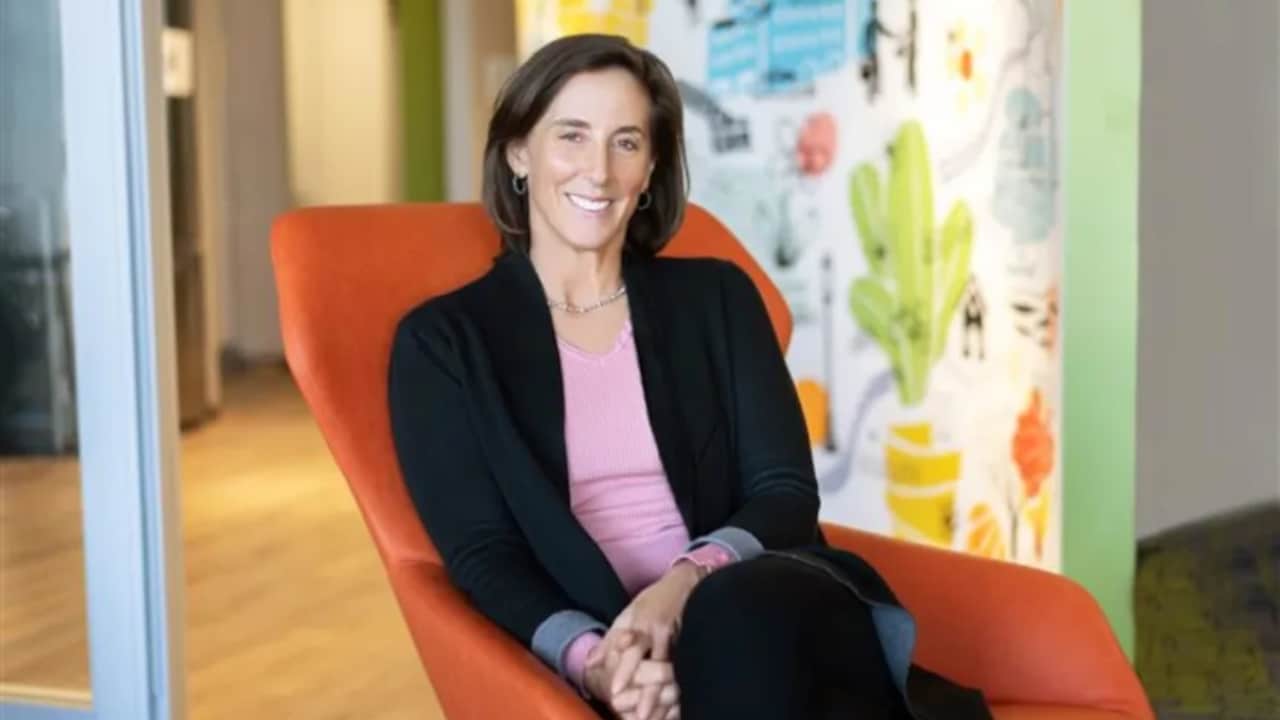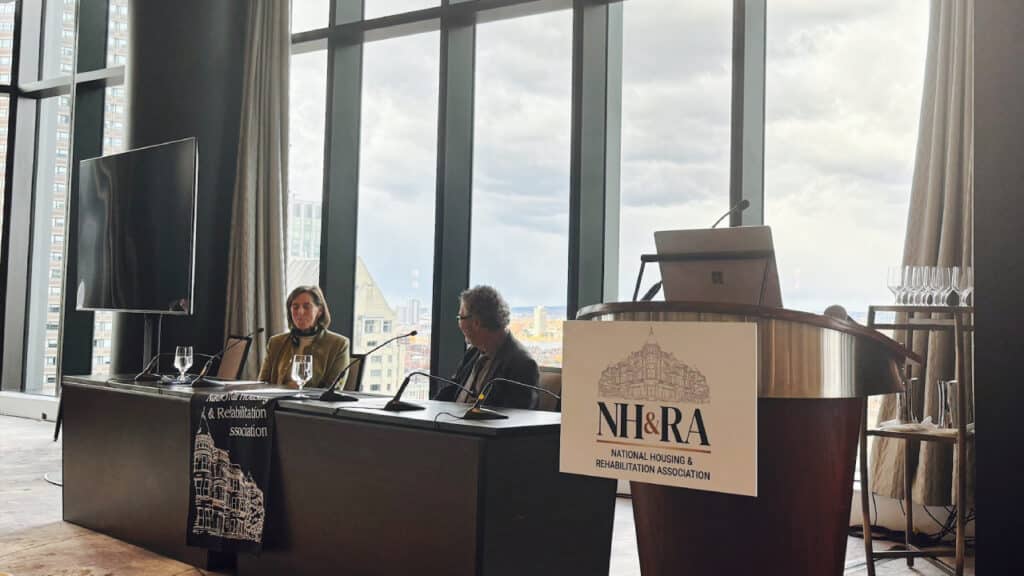Breaking Ground
Dara Kovel, CEO of Beacon Communities, on 'Making Places Special'

By Abram Mamet
10 min read

At National Housing & Rehabilitation Association’s recent fall developers forum, Dara Kovel, CEO of Beacon Communities, sat down for an illuminating discussion with NH&RA president and CEO Peter Bell.
Held at last week’s Fall Developers Forum at the sleek Raffles Hotel in Boston’s Back Bay neighborhood, the engaging 45-minute conversation covered a wide range of topics, including strategies for building a diverse leadership team, leveraging novel technology, successful approaches to adaptive reuse, and even tips for big wave surfing.
Though Tax Credit Advisor featured Kovel in a “Breaking Ground” column just two years ago, today’s discussion comes within a radically different environment. Then, the affordable housing industry was looking toward a future fresh with possibility, having successfully weathered the storms of Covid and the pandemic’s hallmark supply chain woes. Today, things may seem bleaker on the surface, as the dizzying pressures of tariffs and a turbulent federal government have combined with the ongoing expansion of AI to create some unease and uncertainty.
However, Kovel maintained a steady optimism — not surprising, since Beacon has long embraced the most challenging deals as a core business strategy. “We really are attracted to things that challenge us and create longstanding projects that will endure the test of time, be part of neighborhoods and make places special,” Kovel said.
This interview will also kick off a new regular feature for TCA: semi-monthly “Breaking Ground” interviews with executives and experts throughout the industry, conducted by Peter Bell, himself an industry veteran. We hope you enjoy this condensed conversation and look forward to presenting perspective and insight from additional leaders in the coming months. Have a suggestion for an interviewee? Drop us a line!
This interview has been edited for length and clarity.

Peter Bell: You graduated from Yale with a B.A. in English. How did you end up in the affordable housing industry?
Dara Kovel: When I moved from New Haven out to San Francisco, I discovered that there were these organizations that build housing, work with communities, and change neighborhoods. You get to run numbers, boss architects around, talk to contractors, and in the end, create this social good where people can have access to housing. What could be better?
I scooped ice cream for a few months, and then two years into my 20s, I actually landed a job as an administrative assistant at Mercy Housing — I had to get my foot in the door. I promised them great things about how I was going to organize their files, and I never looked back.
PB: Later, you went into the public sector at Connecticut Housing Finance Agency (CHFA), and then to Beacon. How has working at a public agency impacted your perspective?
DK: I actually think that everybody in this industry should take a stint of time in the public sector. We work every day across the table from quasi-public and public agencies, and you don’t know what it’s like to be on that side unless you’ve done it. It’s important to experience actually having to make those decisions, allocate scarce resources, tell people no, negotiate on the public sector side.
I think it’s just tremendously enriching so I think we should all do a two year internship at a public agency if you haven’t done that as part of your career.
PB: Beacon has a very unique perspective. You take pride in tackling deals that others might view as being too difficult to pursue. What are you, a glutton for punishment? What is it about the company that enables you to embrace these challenges?
DK: Glutton for punishment was, in fact, the terminology that came to my mind as well.
The history of Beacon, having developed transformative projects across the city of Boston, set in motion a culture at the organization that really isn’t that interested in doing off the shelf type of development. We really are attracted to things that both challenge us and result in longstanding projects that will endure the test of time, be part of neighborhoods and make places special.
PB: You have 160-plus assets, plus a lot more under development, and 800 employees, with roughly 650 scattered around the field. How do you take a far flung organization like that and make everybody feel part of the team? What kinds of things do you do internally to make everybody feel that they’re part of something bigger?
DK: One of the lessons we learned during the pandemic, and a ritual we’ve now continued, is doing company-wide calls. Every other month, we invite the entire company for an hour to come together, talk a little bit about what’s going on in the organization, where we’re headed, and then focus in — on what we’re doing in maintenance, or what we’re doing in community engagement, etc. — and help tell the story so people can connect that way.
I always get amazing feedback from people feeling like they understand more about what’s going on in their company and feeling connected. We do awards and celebrations that way, too.
More real life, three-dimensionally, the fall is actually a very busy time for us, because we do regional summits. All across our 14 regions — which are all of our property management regions, going from northern upstate New York, out to Ohio, down to Baltimore — we bring people together. We bring property management teams together. This year we did a day of training and a day of fun. I’ve been at laser tag, axe throwing, bumper cars. Down in Mystic, Connecticut, we did a scavenger hunt.
I get to go to all of those and spend some time with the team. And those are the places where you hear these incredible stories of people who have either worked for Beacon for 40 years, or have just joined Beacon and tell stories about how important it is to be able to participate with the team and be seen and connect with the organization. Those two ends of the spectrum are so important for people to feel connected.
PB: Our industry’s seen a lot of growth in the last decade. And one of the challenges I hear from a number of CEOs is that building the right team and finding the right personnel is really a challenge. How do you find the candidates? How do you evaluate candidates, and what makes someone attractive to you to bring on board?
DK: We have, over the last couple of years, finally gotten into place — from the development side, from the finance side, from the entire property management side — leadership that I personally feel is second to none.
I would attribute that to a couple of things. Beacon has this incredible history that attracts talented people to the company. But I also think — from my perspective, when I look at who’s in our leadership team right now — it’s about having fun.
The combination of deep commitment and passion about the mission-orientation of the work, the intellectual curiosity and drive around doing amazing things, and then enjoying the day and having a lot of laughter, I think just brings people naturally together. I am feeling 100 percent thrilled that we’ve got the team we have in place.
PB: I think one of your focuses has been creating opportunities for people who heretofore might not have had the same opportunities. Beacon, in my observation, has always been ahead of the curve in recognizing the value of having a diverse team at all levels of the company. How do you think this has strengthened the company?
DK: I remember [former Beacon CEO] Howard Cohen telling me that one of his success stories in life was surrounding himself with strong women. He was someone who really appreciated the energy that diversity gave him, and the perspective it gave him. He created an environment right off the bat where women could thrive.
I remain incredibly proud. I think our development company has probably more women than men right now — it’s an incredibly talented group of individuals.
In addition to that, we’ve focused very hard over the last few years on making sure we diversify the company in other ways. We’ve focused a lot on our impact and belonging work. I think we have great leadership across the executive team. And we are trying to constantly drive ourselves to bring different perspectives and different people into the company.
PB: Do you have any advice for other organizations looking to increase leadership opportunities for women, people of color — groups that have historically been underrepresented at the leadership level?
DK: There’s really nothing to it, but to do it. Sit down with people, participate in groups that are supporting the next generation of our industry.
PB: You have a big job, a big portfolio and a big team. How do you balance that responsibility and still find the time for yourself? Any advice on that for our industry of “workaholics?”
DK: I think we all owe it not just to ourselves, frankly, but to our teams, to shut down.
I am neurotic about self-care. I think that’s one of those things you are either born with, or you have to train yourself to do.
Self-care is just a constant practice. I think that if we tell each other that we need to do it, and encourage vacations and not being online when you’re taking those times off, we can all do each other a favor by really meaning it, not just saying it.
We can all survive if someone goes away for five days and has a good time and they come back that much more recharged.
PB: I was surprised in doing some background research to find that you are an avid surfer. Tell us a little bit about your surfing experience.
DK: When I was 28 years old and living in San Francisco, I had a friend who invited me to go check out surfing with her. She and I rented some surfboards and some wet suits and went down to Pacifica Beach, just south of San Francisco. We got the you-know-what kicked out of us for about four hours in the water. And she and I both fell in love with it immediately.
It’s an amazing sport. And the mistake everybody makes is: “I tried it and I couldn’t stand up!” It literally took me two years to put my foot onto the board. So lower your expectations, and keep going.
PB: Kind of like getting a deal done.
DK: Exactly!
PB: So which is more elusive: finding the perfect wave or the perfect deal?
DK: Definitely harder to find the perfect deal. There’s always something out there in the ocean. But the perfect deal can be very challenging to find in this day and age.

